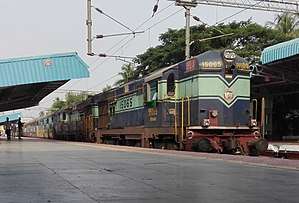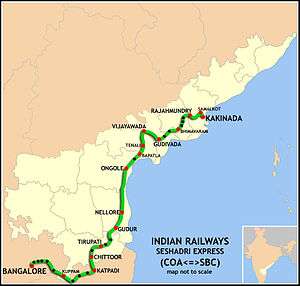Seshadri Express
The Seshadri Express is a train in India, named after the Seshadri Hills, where Tirupati is located. This train earlier ran between Andhra Pradesh's coastal city of Kakinada to Tirupati. This was later extended to Bengaluru, Karnataka in 2005.The Seshadri Express train is considered to be one of the best way to commute to the capital of Karnataka and the most famous pilgrimage center of Tirupati from Godavari District. Though Indian trains are notorious for making terrible time, the Seshadri Express is one of the few which are known for being punctual.
 Seshadri Express at Samalkot Junction | |||||
| Overview | |||||
|---|---|---|---|---|---|
| Service type | Express | ||||
| First service | December 24, 2002 (initial service between Kakinada Town and Tirupati) 2005 (extended to Bangalore City). | ||||
| Current operator(s) | South Coast Railway zone | ||||
| Route | |||||
| Start | Kakinada | ||||
| Stops | 35 | ||||
| End | Bangalore | ||||
| Distance travelled | 959 km (596 mi) | ||||
| Average journey time | 19 hours 45 minutes | ||||
| Service frequency | Daily | ||||
| Train number(s) | 17209 / 17210 | ||||
| On-board services | |||||
| Seating arrangements | Yes | ||||
| Sleeping arrangements | Yes | ||||
| Observation facilities | Standard Indian Railway coaches | ||||
| Technical | |||||
| Rolling stock | 4 | ||||
| Track gauge | 1,676 mm (5 ft 6 in) | ||||
| Operating speed | 50 km/h (31 mph) | ||||
| Rake sharing | Bangalore City - Nagercoil Express | ||||
| |||||
History
It was started in 2002. Prior to the Seshadri Express, a link express from Kakinada, which consisted of 12 compartments, was connected to the Tirumala Express which runs from Visakhapatnam to Tirupati and Samalkot Junction, these two trains were coupled & combinely run together till Tirupati Main. Keeping in mind the growing demand for a new train to the pilgrim centre, the government introduced the Seshadri Express in 2002 and extended it up to Bengaluru. The train thus runs through the loop path of Nidadavolu, Tanuku, Bhimavaram, Gudivada, and Vijayawada to cater to the needs of Godavari and Krishna District.
Coach Composition
The Seshadri Express runs between Kakinada and the software capital of India, Bangalore, via Tirupati. It is currently being operated with 17209 / 17210 train numbers. It is one of the busiest trains, running with 20 coaches at full capacity at all times. It has 6 AC, 10 Sleeper, 3 second-class general compartments, and 2 luggage cum brake vans.
Route
This train runs via Jolarpettai Junction, Katpadi Junction, Tirupati, Renigunta Junction, Tenali Junction, Vijayawada Junction, Gudivada Junction, Nidadavolu Junction, Samalkot Junction.
This train stops at 35 stations that are Bengaluru Cantt, Krishnarajapuram, White Field, Malur, Bangarapet Junction, Kuppam, Jolarpettai Junction, Vaniyambadi, Gudiyattam, Katpadi Junction, Chittoor, Pakala Junction, Tirupati Main, Renigunta Junction, Srikalahasti, Gudur Junction, Nellore, Kavali, Singarayakonda, Ongole, Chirala, Bapatla, Tenali Junction, Vijayawada Junction*, Gudivada Junction, Kaikaluru, Akividu, Bhimavaram Town, Attili, Tanuku, Nidadavolu Junction, Rajahmundry, Anaparti and Samalkot Junction.
*Locomotive is changed at Vijayawada Junction.
Rake Sharing
This train shares it's rake with KSR Bengaluru - Nagercoil Express.
Timings
- Train 17210[1] departs Kakinada Town at 17:30 to reach Tirupati at 5:30 am and Bangalore at 12:30 pm the next day.
- In return, Train No. 17209,[2] Bangalore City – Kakinada Town Seshadri Express, has been revised with effect from 30 Jun 2019, and leaves Bangalore 11:00 am, Tirupati at 5:15 pm and Kakinada Town at 6:45 am the next day.
Hence, this train acts as a night express between Godavari district places and the pilgrimage centre of Tirupati, and also as an Intercity express between Tirupati and Bangalore.
Gallery
 Sesadri express near kr puram
Sesadri express near kr puram.jpg) Seshadri Express
Seshadri Express
